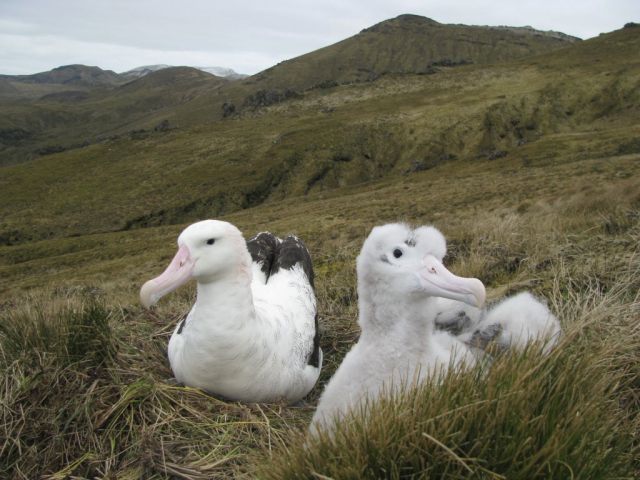Killer mice bring albatross population closer to extinction
The Tristan Albatross, one of the world's most threatened birds, has suffered its worst nesting season ever, according to RSPB research. The number of chicks making it through to fledging has decreased rapidly and it is now five times lower than it should be because introduced predatory mice are eating the chicks alive on Gough Island — the bird's only home and a South Atlantic territory of the United Kingdom.

Tristan Albatross (Photo: Richard Cuthbert)
The mice are also affecting the Gough Bunting, one of the world's largest finches and another species endemic to Gough island. A recent survey of the bunting's population reveals that the population has halved within the last two decades. Now there are only an estimated 400–500 pairs left.
Despite the grave situation for both species on Gough Island, government funding to plan for and take forward the eradication of mice is still lacking. This is despite recognition from two prominent House of Commons Committees that the "biodiversity found in the UK Overseas Territories is equally valuable and at a greater risk of loss" (than the UK) and that current levels of funding are "grossly inadequate". Eradicating mice is the single action that would solve the primary conservation threat facing both species. Because of the impact from introduced House Mice, both the Tristan Albatross and the Gough Bunting were listed earlier this year as Critically Endangered, by BirdLife International. This is the highest level of threat before extinction.
Richard Cuthbert is an RSPB scientist who has been researching the mouse problem on Gough Island since 2000. Commenting on the latest results he said: "We've known for a long time that the mice were killing albatross chicks in huge numbers. However, we now know that the albatrosses have suffered their worst year on record. The mice do not affect the adult albatrosses, but we know from our work that these are being killed by longline fishing vessels at sea. So, unsustainable numbers of this bird are being killed on land and at sea. Without conservation efforts, the Tristan Albatross is doomed. We also know that the mice are predators on the eggs and chicks of the Gough Bunting and mouse predation is the main factor behind their recent decline. We also suspect that the mice may compete with the buntings for food, especially during cold winters."

Gough Bunting (Photo: Richard Cuthbert)
Collaborator Peter Ryan from the University of Cape Town's Percy FitzPatrick Institute has been studying buntings at the island since the 1980s. He said "The decline in bunting numbers is alarming. Without urgent conservation action to remove the mice, both the albatross and the bunting are living on borrowed time."
A complete survey of the Tristan Albatross on Gough Island in January showed there were 1764 adult albatrosses incubating eggs. A later survey revealed that only 246 chicks had survived to fledging.
Richard Cuthbert added: "While some breeding failures would have occurred naturally, the majority of these would have been killed by mice. Far higher numbers of winter-breeding burrowing petrels are also predated by mice. For example, we estimate that half a million Atlantic Petrel chicks will have been eaten last winter."

Tristan Albatross adult with dead chick (Photo: Richard Cuthbert)
The RSPB has been involved in a feasibility study to test whether it is possible to remove the mice. So far, the trials look promising, giving both birds a more optimistic future. Funding on this year's work on Gough has come from the Overseas Territory Environment Programme (OTEP). Removing rats from seabird islands has been conducted in several parts of the world with great success, and the RSPB is working with New Zealand conservationists to tackle removal of the smaller mice. The procedure will involve dropping poisoned bait from helicopters.
Alistair Gammell is the RSPB's International Director. He said: "We are grateful to the Government for funding to allow us to assess the feasibility of removing mice. It is essential that the Government commits adequate funding for the protection of the many threatened species found on the UK's Overseas Territories. We are challenging the Government to prove its commitment to conservation by properly funding conservation initiatives in these territories, and most urgently to commit to funding the removal of mice from Gough."
The RSPB is not alone in calling for greater funding. The House of Commons Environmental Audit Committee on Halting Biodiversity Loss, published in November, stated: "One of the most important contributions that the Government could make to halting biodiversity loss would be to provide more support for the UK Overseas Territories, where it is the eleventh hour for many species. Although England has a number of internationally important species and habitats, the biodiversity found in the UK Overseas Territories is equally valuable and at a greater risk of loss. The Government must act now to protect these areas." The House of Commons Foreign Affairs Committee for the UK Overseas Territories stated in June: "The environmental funding currently being provided by the UK to the Overseas Territories appears grossly inadequate and we recommend that it should be increased."
House Mice were introduced accidentally to Gough island by sealers during the 18th or 19th century.

